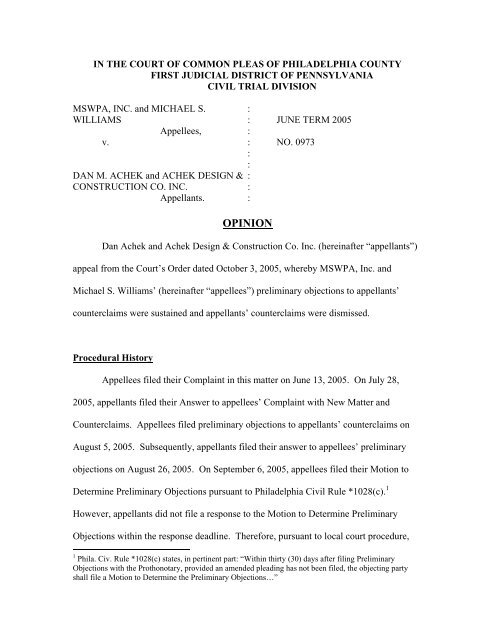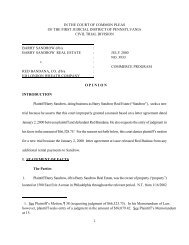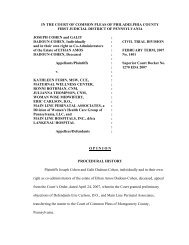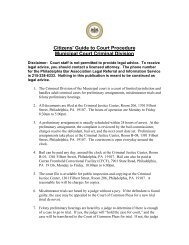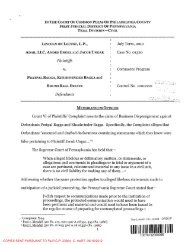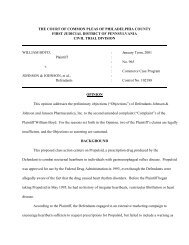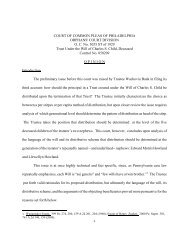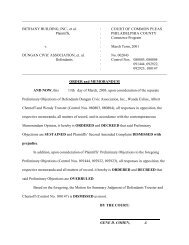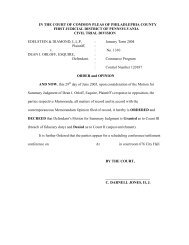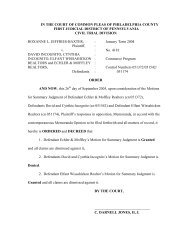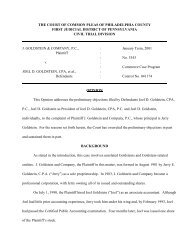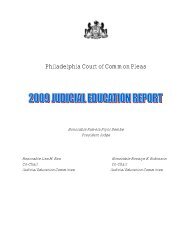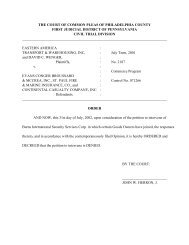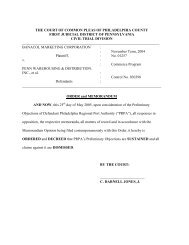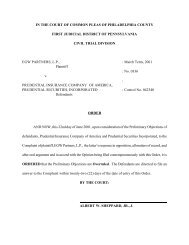OPINION - The Philadelphia Courts
OPINION - The Philadelphia Courts
OPINION - The Philadelphia Courts
Create successful ePaper yourself
Turn your PDF publications into a flip-book with our unique Google optimized e-Paper software.
IN THE COURT OF COMMON PLEAS OF PHILADELPHIA COUNTY<br />
FIRST JUDICIAL DISTRICT OF PENNSYLVANIA<br />
CIVIL TRIAL DIVISION<br />
MSWPA, INC. and MICHAEL S. :<br />
WILLIAMS : JUNE TERM 2005<br />
Appellees, :<br />
v. : NO. 0973<br />
:<br />
:<br />
DAN M. ACHEK and ACHEK DESIGN & :<br />
CONSTRUCTION CO. INC. :<br />
Appellants. :<br />
<strong>OPINION</strong><br />
Dan Achek and Achek Design & Construction Co. Inc. (hereinafter “appellants”)<br />
appeal from the Court’s Order dated October 3, 2005, whereby MSWPA, Inc. and<br />
Michael S. Williams’ (hereinafter “appellees”) preliminary objections to appellants’<br />
counterclaims were sustained and appellants’ counterclaims were dismissed.<br />
Procedural History<br />
Appellees filed their Complaint in this matter on June 13, 2005. On July 28,<br />
2005, appellants filed their Answer to appellees’ Complaint with New Matter and<br />
Counterclaims. Appellees filed preliminary objections to appellants’ counterclaims on<br />
August 5, 2005. Subsequently, appellants filed their answer to appellees’ preliminary<br />
objections on August 26, 2005. On September 6, 2005, appellees filed their Motion to<br />
Determine Preliminary Objections pursuant to <strong>Philadelphia</strong> Civil Rule *1028(c). 1<br />
However, appellants did not file a response to the Motion to Determine Preliminary<br />
Objections within the response deadline. <strong>The</strong>refore, pursuant to local court procedure,<br />
1 Phila. Civ. Rule *1028(c) states, in pertinent part: “Within thirty (30) days after filing Preliminary<br />
Objections with the Prothonotary, provided an amended pleading has not been filed, the objecting party<br />
shall file a Motion to Determine the Preliminary Objections…”
appellees’ Motion to Determine Preliminary Objections was sent by Motions Court to the<br />
trial judge without a response to the Motion to Determine Preliminary Objections and<br />
with the notation “uncontested.” <strong>The</strong> Court then entered an order on October 3, 2005,<br />
which sustained appellees’ preliminary objections as “uncontested” and dismissed<br />
appellants’ counterclaims with prejudice.<br />
On November 2, 2005, appellants filed a Motion for Reconsideration seeking<br />
reconsideration of the Court’s Order dated October 3, 2005, and docketed in October 4,<br />
2005. <strong>The</strong> Motion for Reconsideration was assigned to the trial judge on November 4,<br />
2005. <strong>The</strong> Court had thirty (30) days from the date of entry of the Order to act upon the<br />
Motion for Reconsideration. 2 <strong>The</strong> thirty-day period expired on November 3, 2005.<br />
Since the Court did not receive the Motion for Reconsideration until November 4, 2005,<br />
it was without jurisdiction to act upon the Motion for Reconsideration. <strong>The</strong>refore, the<br />
Court dismissed appellants’ Motion for Reconsideration. Appellants timely filed their<br />
notice of appeal.<br />
Discussion<br />
Appellants argue that the Court erred in sustaining appellees’ preliminary<br />
objections because they “filed a timely response to [appellees’] Preliminary Objections.”<br />
See Appellants’ 1925(b) Statement of Matter Complained of, 1. However, appellants<br />
are confusing an “answer to preliminary objections” with a “response to a motion to<br />
2 See Schoff v. Richter, 386 Pa. Super. 289, 291, 562 A.2d 912, 913 (1989) (“<strong>The</strong> trial court is permitted to<br />
grant reconsideration only if such action is taken during the applicable appeal period. An order granting<br />
reconsideration will only be effective if it is made and entered on the docket before expiration of the<br />
applicable appeal period, 30 days from the entry of the order which is the subject of the reconsideration<br />
motion, and if it states that it is expressly granting reconsideration.”); Commonwealth v. Moir, 2000 Pa.<br />
Super 403, *P4, 766 A.2d 1253, 1254 (2000) (“Failure to expressly grant reconsideration within the time<br />
set by the rules for filing an appeal will cause the trial court to lose its power to act on the application for<br />
reconsideration.”); See also Pa. R.A.P. 1701 (“Effect of Appeal Generally”) and its comment.<br />
2
determine preliminary objections.” 3 Appellants are correct that they timely filed an<br />
answer to appellees’ preliminary objections. However, appellants never filed a response<br />
to appellees’ Motion to Determine Preliminary Objections. “It is only within the<br />
response to the Motion [to Determine Preliminary Objections] that a responding party has<br />
the opportunity to include a Memorandum of Law explaining to the Court why the<br />
preliminary objections should be overruled.” See Durkin v. Breen, 2005 Phila. Ct. Com.<br />
Pl. LEXIS 391, *2-3 (2005).<br />
Motions Court in <strong>Philadelphia</strong> County will only send a motion to the appropriate<br />
judge for consideration when there is a complete motion “package.” According to the<br />
<strong>Philadelphia</strong> Court of Common Pleas Civil Practice Manual, “When the motion is<br />
initially filed, the motion clerk enters the response date into a computer. When that date<br />
arrives, the motion file is forwarded to the appropriate judge for determination, whether<br />
the response has been filed or not. It is incumbent upon responding counsel to respond to<br />
the motion in a timely fashion…” See Civil Practice Manual, Twelfth Edition, § 7-2.7.<br />
Appellants simply failed to follow the local rules by not filing a timely Response to the<br />
Motion to Determine Preliminary Objections.<br />
<strong>The</strong> case of Schuylkill Navy v. Langbord, 1999 Pa. Super. 75, 728 A.2d 964<br />
(1999) is particularly applicable to the case at bar. Similar to the present case, the<br />
appellants in Schuylkill Navy filed an answer to appellees’ preliminary objections, but<br />
failed to file a response with supporting memorandum of law in a responsive motion<br />
3 Indeed, the <strong>Philadelphia</strong> Civil Rules distinguish between an answer to preliminary objections and a<br />
response to a motion to determine preliminary objections. See Phila. Civ. Rule *1028(c)(5) (“An answer<br />
to preliminary objections (as opposed to a Response to the Motion to Determine Preliminary Objections) is<br />
required only to preliminary objections raising an issue under Pa.R.C.P. 1028 (a)(1), (5) and (6) provided a<br />
notice to plead is attached to the preliminary objections. An answer need not be filed to preliminary<br />
objections raising an issue under Pa.R.C.P. 1028(a)(2), (3) and (4).”) (emphasis added).<br />
3
package. <strong>The</strong> trial court sustained appellees’ preliminary objections as “uncontested.”<br />
Appellants then filed an appeal of the trial court’s decision. On appeal, the Superior<br />
Court upheld the trial court’s decision and found that the trial court did not err when it<br />
failed to consider appellants’ answer to the preliminary objections. <strong>The</strong> Superior Court<br />
stated:<br />
Appellants ignored critical filing procedures essential to<br />
proper motion court practice in <strong>Philadelphia</strong> County. Thus,<br />
Appellants did not ensure that their responses to Appellees'<br />
preliminary objections would be before the trial court for<br />
its consideration as Appellants simply did not follow the<br />
rules. <strong>The</strong>refore, Appellants cannot now complain that the<br />
trial court erred when it failed to consider their responses to<br />
Appellees' preliminary objections. Accordingly, we agree<br />
with the trial court that Appellants' blunder is not excusable<br />
and does not constitute trial court error.<br />
Schuylkill Navy, 1999 Pa. Super. at *P10, 728 A.2d at 968.<br />
Were it not for appellants in the case at bar filing their Motion for<br />
Reconsideration (to consider its Response to the Motion to Determine Preliminary<br />
Objections) in such a manner that the trial judge was assigned the Motion after losing<br />
jurisdiction, the Motion would have been considered on its merits, and at least appellants<br />
would have be given an opportunity to amend their counterclaim in the event the<br />
preliminary objections to the counterclaim were sustained on the merits. This Court<br />
suggests that the matter be remanded for further proceedings related to the preliminary<br />
objections, despite the procedural chaos created by appellants.<br />
Dated: December 13, 2005<br />
4<br />
BY THE COURT:<br />
______________________________<br />
HOWLAND W. ABRAMSON, J.


